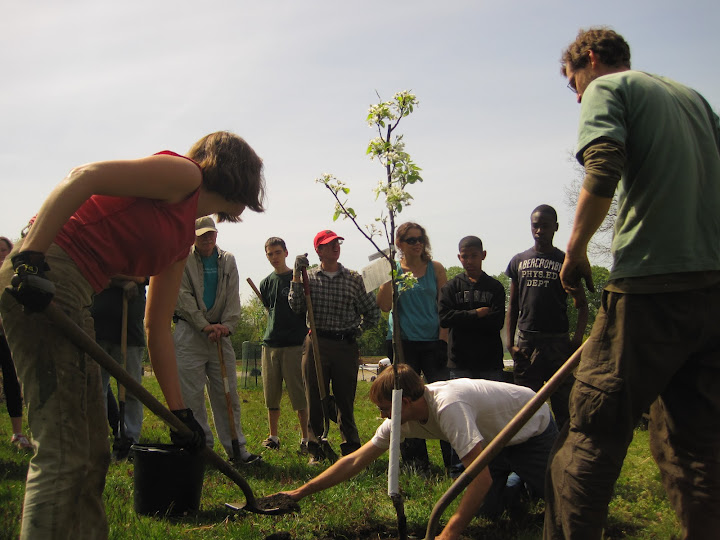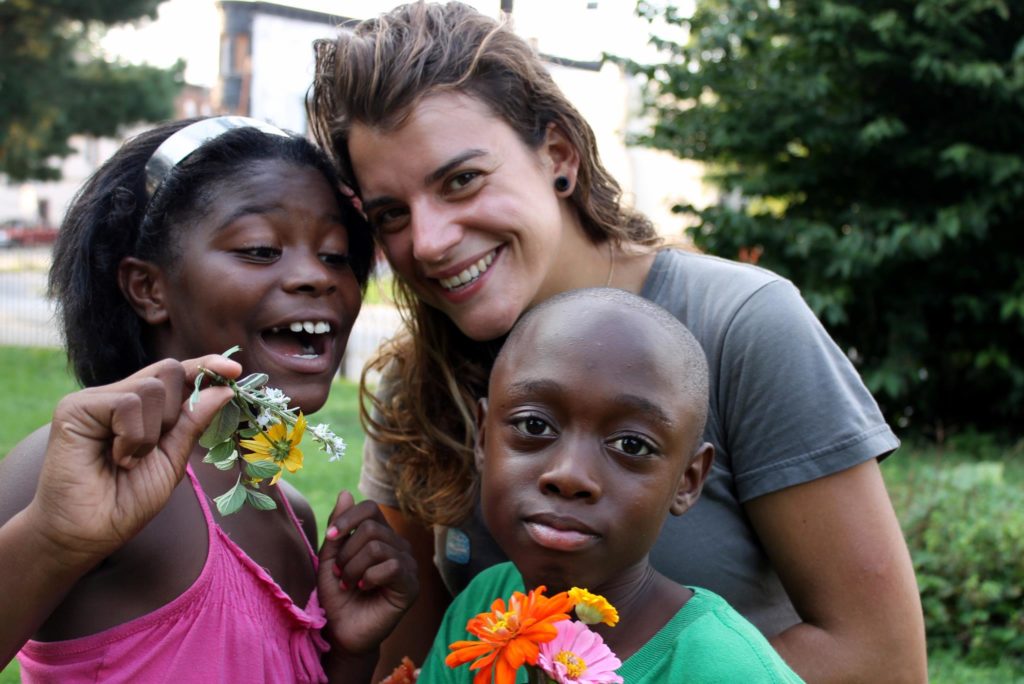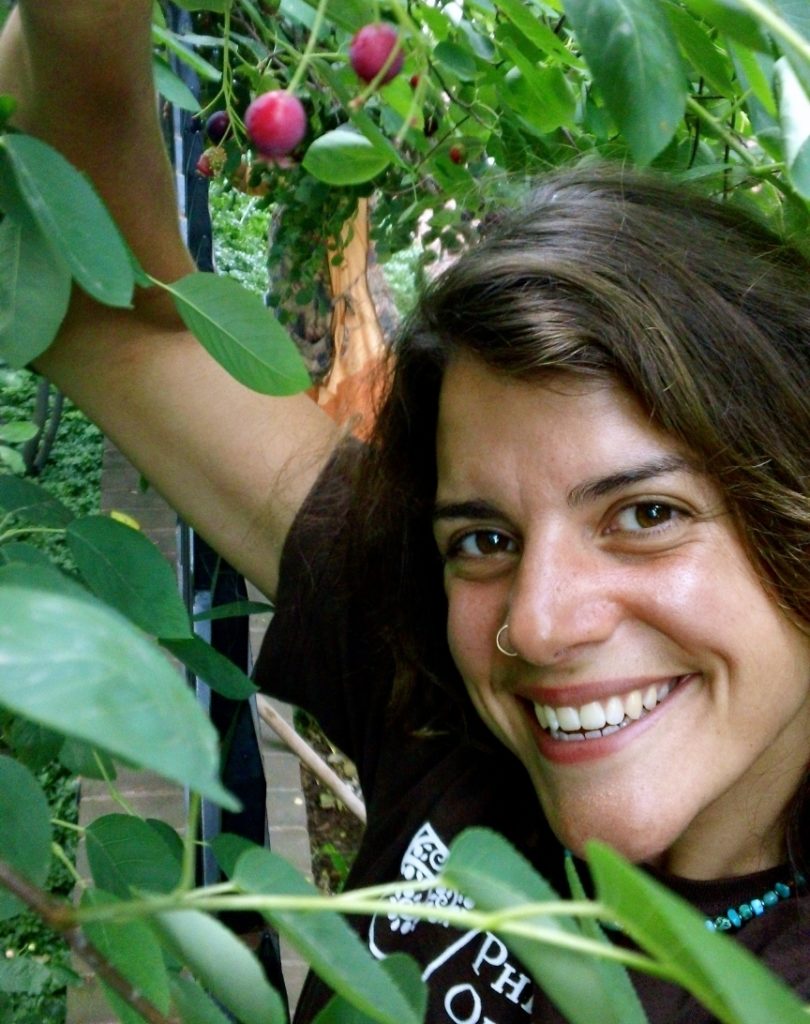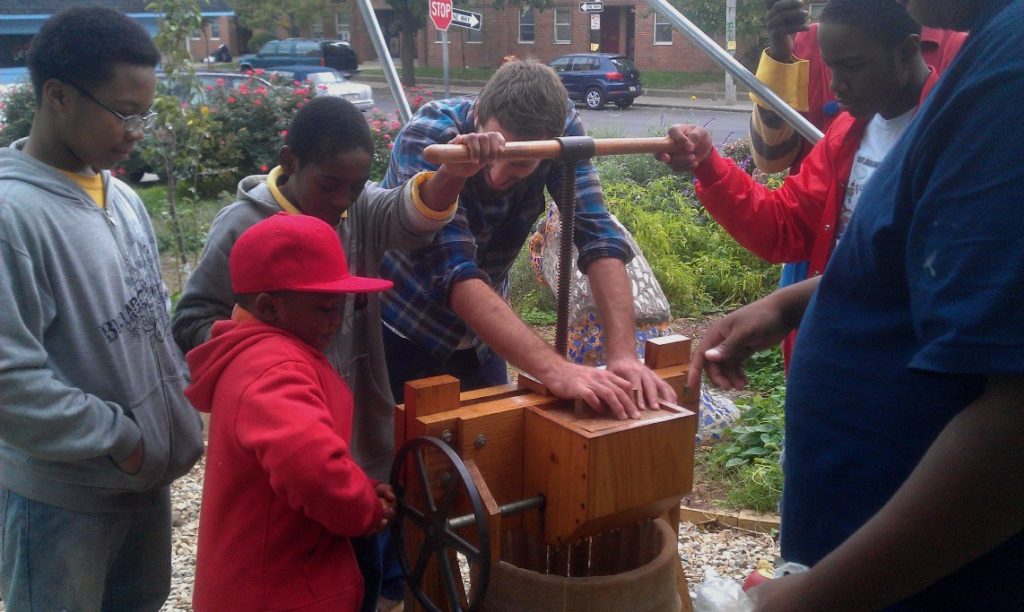“I am continually learning that I’m a steward to each piece of earth I touch, and my history with POP has ensured that I can not only survive, but I am able to thrive, doing what I am compelled with all of my being to do.”
-Robyn Mello, POP Orchard Director and 2011 Golden Persimmon Volunteer
In honor of the Philadelphia Orchard Project’s 10th anniversary in 2017, we’re looking back at a different year in our history every month. We’re also designating Golden Persimmon Awards for each year in recognition of the extraordinary efforts of our volunteers.

POP VOLUNTEER HIGHLIGHT: Robyn Mello
POP’s current Orchard Director, Robyn Mello, started out by volunteering at POP plantings and as a member of POP’s Orchard Committee.
At the age of 21, I had an epiphany that I was entirely dependent on global systems that were completely outside of my control, despite disagreeing with a huge percentage of their practices. I moved to Philly after college because I wanted to learn how to truly take care of myself. Simply reading about permaculture and food forests and intensive growing practices and herbal medicine wasn’t enough–I needed to do the work to understand. So I started a food forest, called Mercy Edible Park, on a dozen vacant lots in South Philadelphia. Learning the ins and outs of land policy, gentrification, city government, community organizing, racial and economic disparities, and neighborhood histories came neck and neck with learning that mugwort and bricks were the most common occupants of Philadelphia’s neglected yet abundant vacant lot green spaces. I quickly made friends with all of the obstacles and in so doing, soon learned that growing food touches upon what it means to be truly free.
Organizing to start gardens on squatted land with various neighborhoods before and after Occupy Philly quickly found me out to lunch with Paul Glover, POP’s founder. We came to a conclusion by the end of my first work party that Paul attended which has been a mantra of mine ever since: “It’s not about overthrowing systems of oppression, it’s about ‘undergrowing’ them.” Weeding a strawberry patch with strangers that don’t look like me and come from different backgrounds has resulted in some of the most eye-opening and radical conversations I’ve ever had, not to mention an ever-expanding number of friends and allies. Growing food and community in spaces that are otherwise considered neighborhood nuisances provides a vision for a future that’s more present and connected and hopeful, and not tied to constructing yet another expensive new home and ripping holes in the fabric of a close-knit community.

I liked to think of the work I was doing on squatted lots as filling in the gaps where POP couldn’t go, based on ownership and land access (you can’t plant a permanent food forest on unstable land), but the volunteering I did with POP and the encouragement I got from Phil from the very beginning was critical to my growth and success. When I met POP Board Members Kim Jordan, Anne Taylor, and Brian Olszak at the SHARE Orchard expansion planting and planted my first peach tree with Kim in 2010, everyone very quickly felt like friends. My first ever POP event was planting the Evelyn Sanders Orchard, which I then came to tend and expand as Gardens Manager with Historic Fair Hill from early 2011 through early 2013, largely thanks to a recommendation from Phil. During my tenure with Historic Fair Hill, I also helped to organize POP’s first Orchard Day so that different celebratory harvest events could happen at POP orchards simultaneously throughout the city (stay tuned for POP’s 7th annual Orchard Week this October!).
In 2013, I was given the opportunity to start an off-grid farm in a rural area in Bucks County, so I moved from the city. By the end of that season, I realized I had made a mistake. I wasn’t ready to give up my urban life or my friends or my activism as a 25 year-old, and what I really wanted was land of my own where I could plant trees! After moving back to Philly, I attended a POP Orchard Committee meeting specifically about starting a gleaning program to make use of otherwise wasted fruit in the city. Lo and behold, this was exactly what I had wanted to do while farming, having learned that nearly half of all produce grown in the United States goes uneaten every year despite 1 in 6 Americans being food insecure, more and more arable land being destroyed, and 65% of all fresh water being used to irrigate crops. We don’t need more farms or farmland, we need to prioritize better growing practices and more accessible distribution of land and food!
Just a little while after this gleaning meeting, Phil gave me a call to ask if I’d like to start working part-time as his co-worker. And would I be okay with helping to design my position, including a gleaning program? This was a total no brainer. YES! The rest, as they say, is history. I organized my first POPHarvest juneberry gleaning in early June, 2014, and I’ve had the opportunity to grow in my experience, exposure, creativity, and ability to share passion and knowledge via POP programming ever since.

I’m the type of person who needs a variety of ways to express my love and convictions, and I need a lot of freedom and flexibility to create. My ability to continually shape my role with POP over the years–as both volunteer and employee–and watch my influence on the organization as a whole feels pretty unique and special within a professional context. Additionally, the expansion of POP’s staff over the last year to include Alyssa and Tanya has continued to surprise me with how talented and supportive a team we have!
Witnessing and impacting the growth of this city’s vast network of urban eco-orchards and people attached to them has been the best gift I could imagine. In order to feel like a well-balanced human living symbiotically within an overwhelmingly complex ecosystem, in order to not crumble under the weight of the world’s inequalities and intolerances, it is crucial for me to make time for celebration, grief, and reflection. POP’s community orchards and their stewards provide this city with 57 sites throughout our collective concrete jungle that provide space for fulfilling human needs and emotions outside of fast-paced, high-stress, plugged-in, unhealthy, no-time-for-anything Northeastern cultural norms. I am continually learning that I’m a steward to each piece of earth I touch, and my history with POP has ensured that I can not only survive, but I am able to thrive, doing what I am compelled with all of my being to do.
SUPPORT US! If you found this entry useful, informative, or inspiring, please consider a donation of any size to help POP in planting and supporting community orchards in Philadelphia: phillyorchards.
